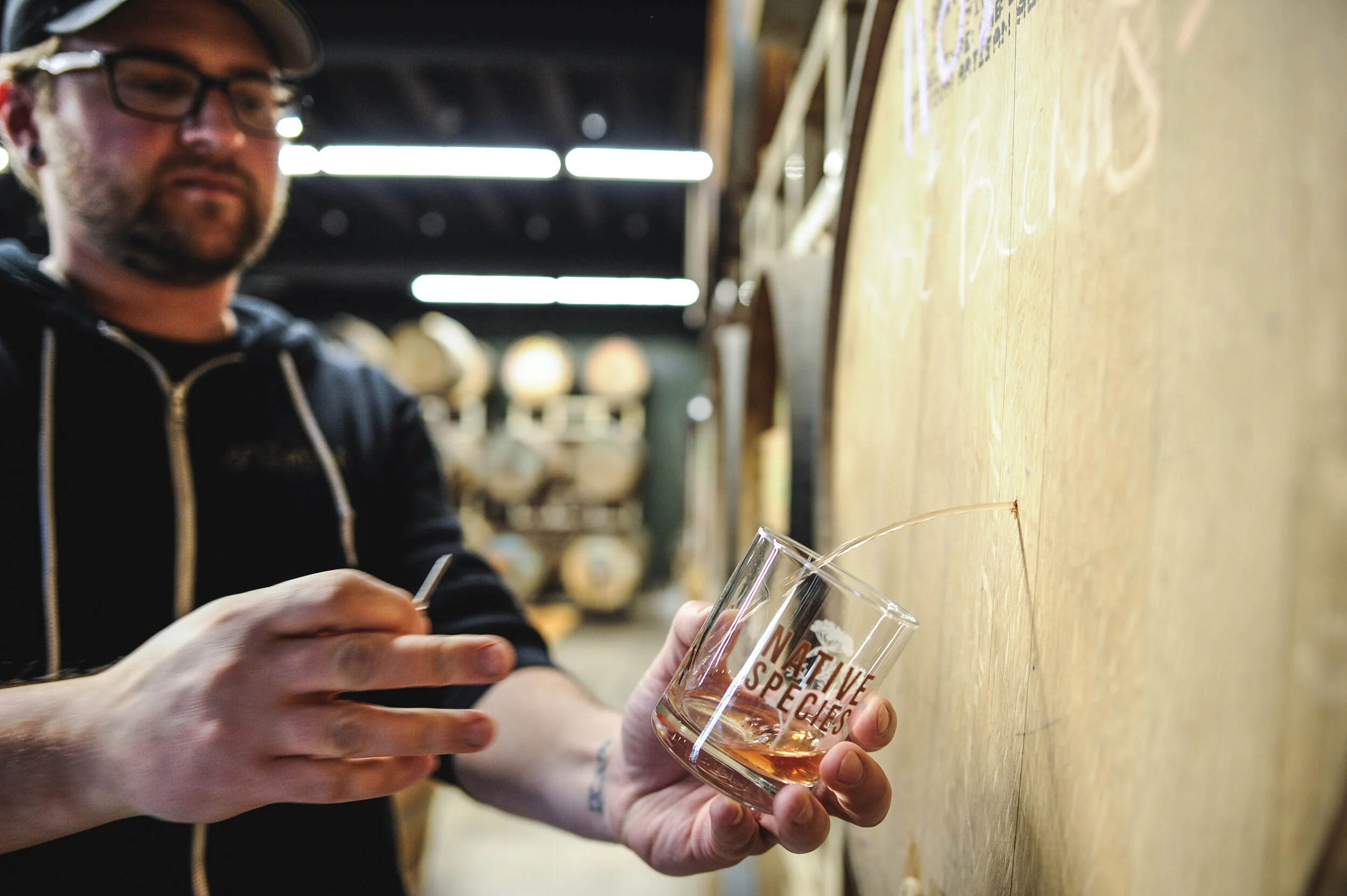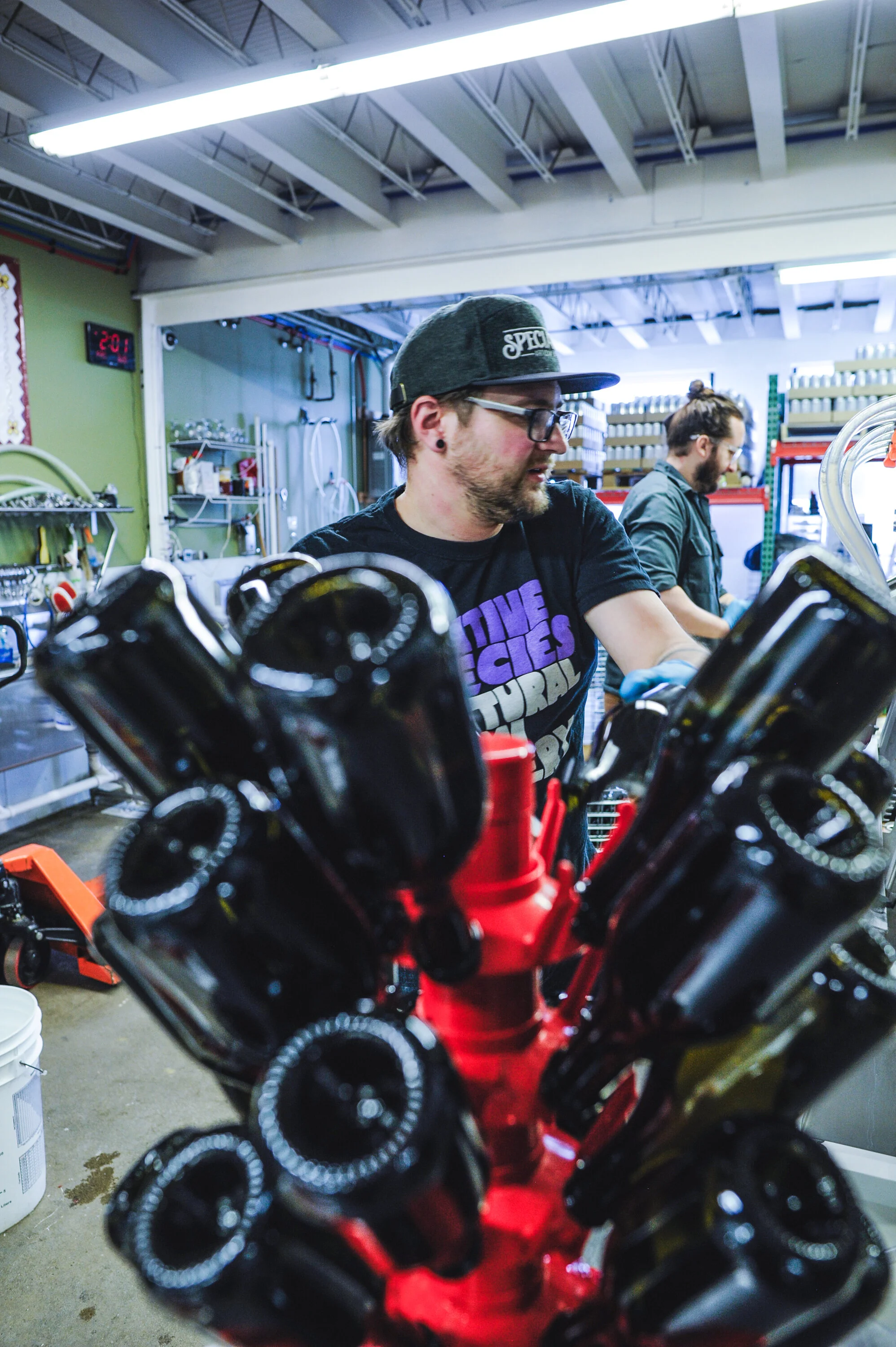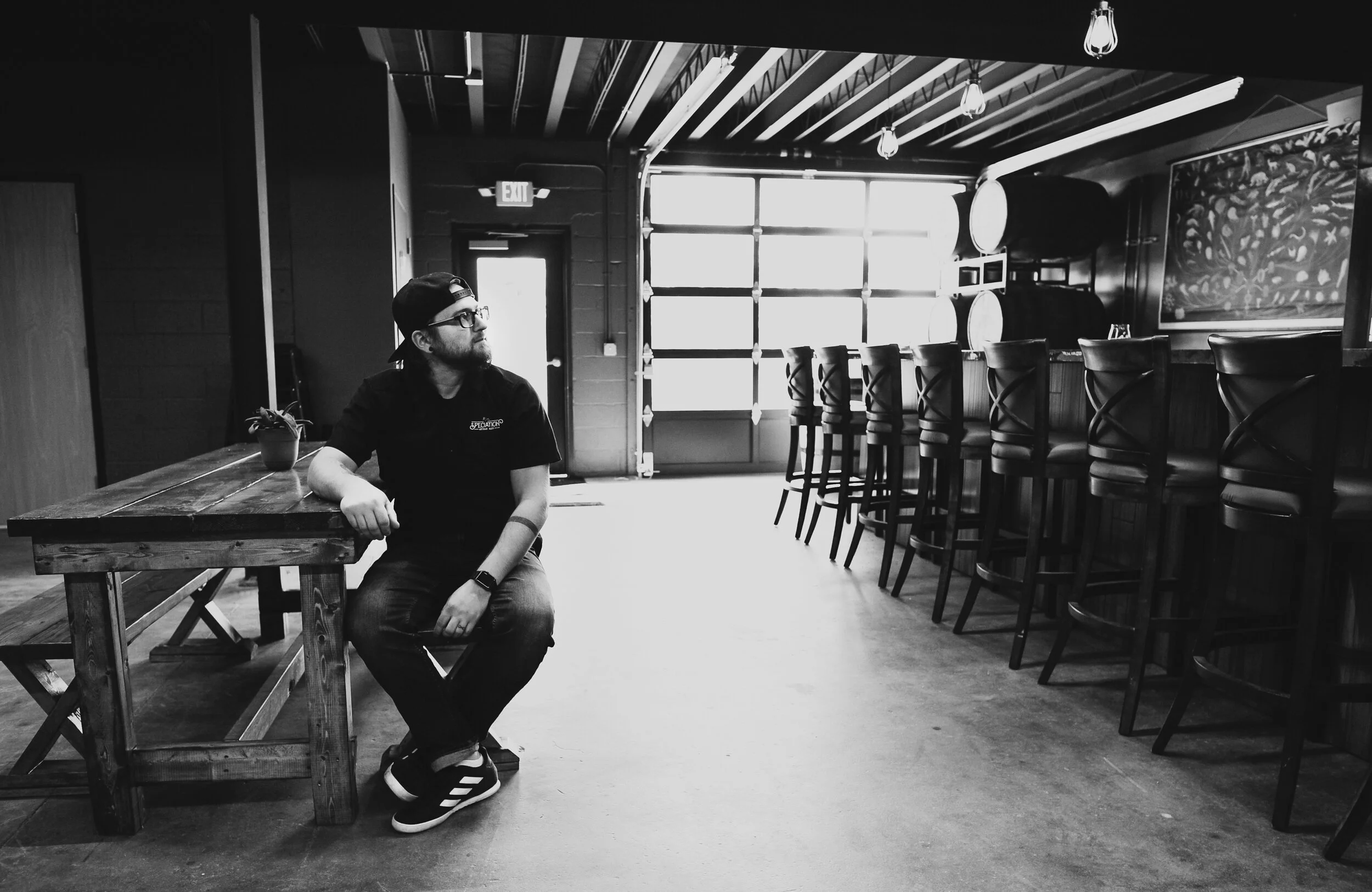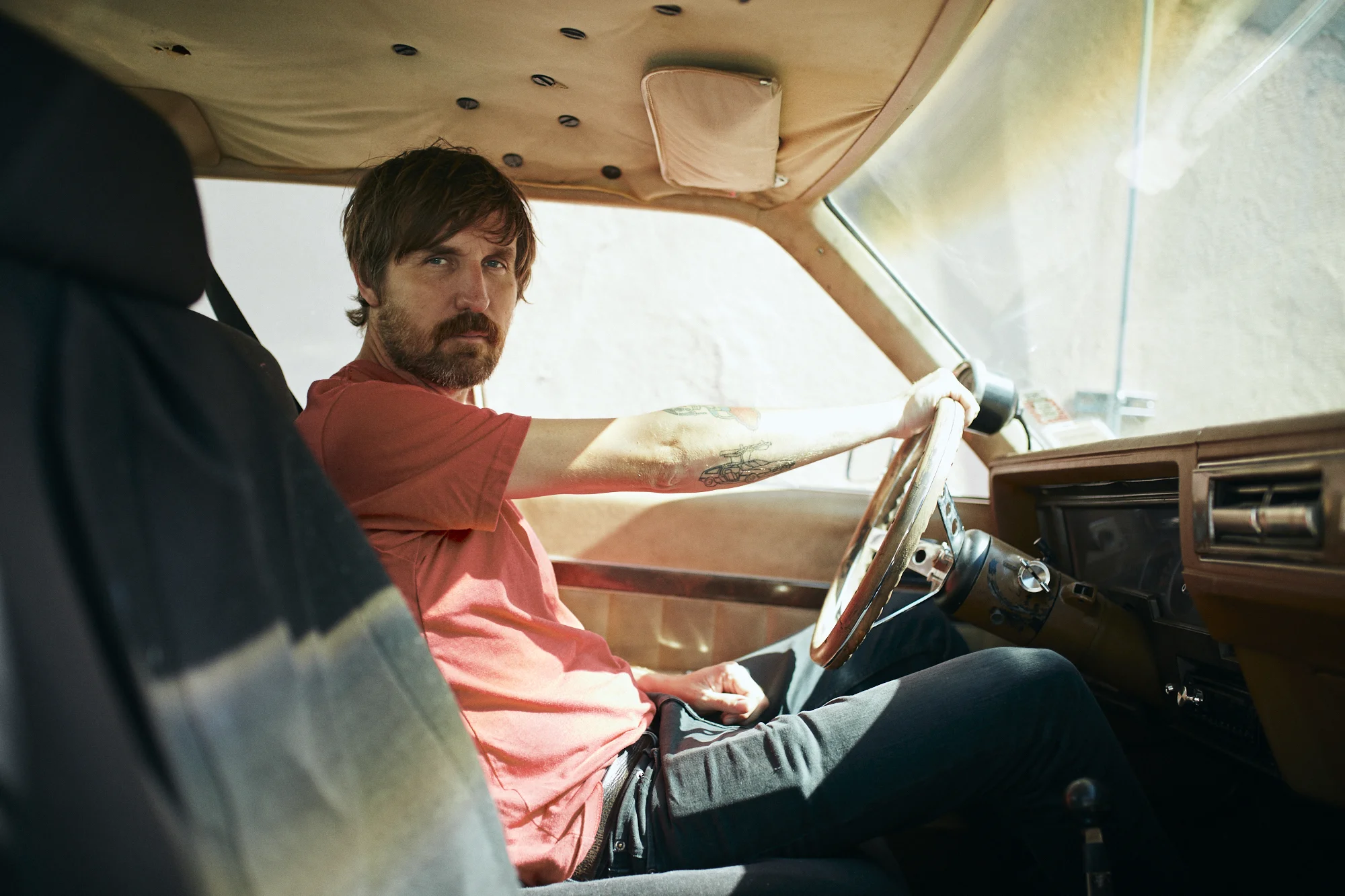Making Progress with Mitch Ermatinger of Speciation Artisan Ales and Native Species Winery
Mitch Ermatinger’s brewing career began with a bang—or, more accurately, a bung—amid the oak barrels at Denver, Colorado’s Black Project Spontaneous & Wild Ales. Here, he would develop his cellaring skills and knowledge of wild fermentation working under James and Sarah Howat, contributing to their team by winning back-to-back Great American Beer Festival medals.
Photography by Steph Harding
Despite this acclaim, Mitch’s dream was always to start his own brewery. After two years at Black Project, he returned home to Michigan and began to hatch a plan, inspired, as he puts it, “by the natural variations and drifting of species that can be found in nature.” His reputation grew fast as he helped another local beer producer, Harmony Brewing Company, launch its sour program, while also sharing his homebrewed efforts at events and parties.
In early 2017 he opened Speciation Artisan Ales with his wife, Whitney, in Comstock Park, a suburb of Grand Rapids. The small operation quickly gained a devoted following for its elegant wild, sour, and mixed-culture beers shaped by Michigan ingredients; vibrant reflections of their surroundings like Genetic Drift, a tart, funky saison fermented with yeast collected from crab apple flowers picked at his family’s property.
On opening, Speciation smashed its initial production and sales projections, selling over 15,000 bottles in less than six months. This success led to an expansion into an adjacent space that allowed for a proper taproom, where we would sit at a communal table to split a bottle of Frontenac (a French-American hybrid grape variety) a rich, full-bodied red wine released under Mitch’s new wine label, Native Species.
The reason why Mitch chose to share his wine and not beer is that he can no longer drink the latter. A few weeks prior, he was told he had coeliac disease, an autoimmune disorder that attacks the small intestine and is controllable only by eliminating foods containing gluten, a protein found in wheat, rye, and barley—the nuts and bolts of beer.
At the time I wondered, perhaps a little selfishly, what this diagnosis would mean for the future of Speciation’s captivating output. The production of wild beers is at some level an artistic pursuit, impelled by the attention to subtle signals through which brewers can shape their vision from what nature provides. The kind of subtly that is perhaps only properly shepherded by tasting.
“I can remember what it’s like to taste our beers, so I’m not completely in the dark,” Mitch tells me. “But for how long and how far that can take me, I don’t know.”
It’s understandable, then, that Native Species since has morphed from side gig into a full-time operation, one that shares Speciation’s principles of sourcing Michigan-grown ingredients and applying hands-off, nature-driven fermentation methods, while also interpreting winemaking from a brewers perspective. And for Mitch, the notion to augment his repertoire and make natural wines felt, well, natural.
***
Niko Krommydas: We last spoke a year ago, right before Native Species was set to start, but I don’t think we covered how you got into wine.
Mitch Ermatinger: It was really in 2017, after a few trips to Europe. My old boss at Black Project, James [Howat], put a natural wine in front of me at a wine bar on a canal in Amsterdam and told me what these winemakers were doing. I was hooked, and it made sense. The flavours were recognisable due to my experience with sour beer, but also foreign in an exciting way.
NK: What was it specifically that inspired you enough to start making natural wine?
ME: I love the idea of terroir, and natural wine embraces that idea to its fullest extent. Like the beer we make, there's seemingly unlimited combinations of flavours that can be achieved through fermentation and raw ingredients. Another part of the equation is that wine doesn't make me feel horrible like beer does.
NK: You source the majority of your grapes from a nearby vineyard, Domaine Berrien Cellars. What has working with the vineyard taught you about terroir in general, and specifically Michigan’s climate for growing?
ME: We source a ton of grapes from them, but we also source grapes from other growers along the Lake Michigan shore. It's super interesting tasting the same wine sourced from two different local vineyards. We have a barrel full of skin-contact Seyval Blanc from Berrien, and a barrel of the same from Morgan Vineyards. Our process was more or less identical with both grapes, but the flavour profile is drastically different from barrel to barrel. But one has these awesome oxidative, sherry-like flavours and is rich and full, and the other is super overripe tropical fruit.
We’re good at growing fruit here in Michigan, obviously, but it seems like the key is picking the right fruit to grow. That means that we have to use cold, hardy vinifera and hybrids developed for our northern climate.
““Brewers have a lot to learn from natural winemakers when it comes to embracing terroir, but we’re definitely making progress.””
NK: Did you find that same kind of flavour variation from the results of the Laurentian series (a series of beers spontaneously fermented in a mobile coolship by the Great Lakes)? The ingredients and brewing process were the same for each beer, right?
ME: With brewing we have so many variables, especially considering that every Laurentian beer has been brewed at a different brewery near that lake. There are differences from batch to batch, but I can't assign certain flavours to the terroir of one region versus another. That's not to say that the Laurentian beers don't capture the terroir, or that terroir isn't important with those beers, it's just harder to quantify.
NK: Your wines feature some more obscure varieties of grapes. What interests you about working with, say, a Vignoles instead of a Merlot?
ME: We love working with grapes that are under the radar. There's a staggering variety of grapes out there, and we see no point in making yet another Merlot or Pinot Noir. We typically only work with vinifera if one, we really like the grape, and two, it grows well in Michigan. Along those lines, we’re committed to using only Michigan-grown fruit. Michigan is an awesome state for agriculture, but our wine has gotten a bad reputation due to grossly sweet blends. This is thankfully changing quickly, though, as there are a number of top-notch wineries here now, and a bunch of new ones popping up. Even a few of the old-guard wineries are starting to produce some interesting wines.
NK: Borrowing a technique from the beer world, you split one of your first wines into Scotch whisky and bourbon barrels. Were you happy with the results?
ME: We’re very happy with those wines. If nothing else, we learned that it can be done and doesn't have to be gimmicky. Most wine folks think it's complete blasphemy to barrel age like that, but we honestly don't care. We’re just trying to make interesting things, push boundaries, and see what sticks.
One of our favourite wines we did last year is a BLiS maple syrup bourbon barrel-aged Frontenac. It has the intensity of a massive barrel-aged imperial stout, but takes everything to a whole new level with the grapes. For the 2019 run, we’re sticking to neutral oak and stainless ageing vessels, but there's a good chance we’ll reintroduce spirit barrel-aged wines this year. Another boundary we plan on crushing is hopped wine. We plan on dry-hopping some orange wine with Michigan Chinook, and I'm really excited to see how that turns out.
NK: There are some similarities between natural wines and wild-fermented beers. Has your entry into winemaking made you view or approach brewing any different?
ME: It's funny talking to winemakers because we have so many similar techniques. But the lingo is totally different. There's not a ton of communication between the two camps yet so sometimes it takes a while to figure out what they’re talking about. As far as our approach to beer, just a little bit. We've had a few good ideas about carbonically macerating in beer instead of CO2, and a few batches of beer that were spontaneously fermented with fruit instead of a coolship inoculation.
NK: What’s the most important thing you’ve learned about winemaking so far?
ME: To listen and learn from people who have been making wine for a long time, but don't just do what they say. Learn why they have their opinion, and form your own opinion. We've learned a lot from these winemakers, even if we disagree with a lot of their practices—especially regarding sulphites and other additives.
It's interesting hearing beer people react to our methods of winemaking. We explain that we just crush the grapes and then let them spontaneously ferment on their skins, and the most common reaction is, “I thought that all wine was made that way?" We don't alter our wines in any way. They are truly raw and wild. Each batch will be unique year after year. Brewers have a lot to learn from natural winemakers when it comes to embracing terroir, but we’re definitely making progress.
““We plan on dry hopping some orange wine with Michigan Chinook, and I’m really excited to see how that turns out.””
NK: Given your diagnosis, presumably there is a greater reliance on your staff in the production process. What does creating a beer look like for Speciation right now, compared to a few years back?
ME: Honestly, not much has changed! We have an excellent team and tasting panel that includes our lead blender, my wife, our winemaker, and our production assistant. For the last two-plus years, the workflow is that I come up with 90 percent of the ideas, ingredients, recipes, etc., and then the staff executes on that. They taste beers in process frequently, and can easily spot problems if they come up. Typically they only came to me to taste something when there was a disagreement or a flaw that was somehow missed.
One thing that has changed since the diagnosis is that we have formalised the way we clear beers from production to be released to the public. We now keep detailed tasting notes during tasting panels, and we only release a beer if the staff decides to clear it together.
NK: With a year of hindsight, and seeing how you’ve grown the business, would you call the diagnosis a blessing in disguise?
ME: I don't really believe in blessings, but it was a really interesting coincidence, eh? We were already pushing into non-beer products, so the diagnosis certainly helped speed things up. I still miss beer like crazy, though. Especially [Bell’s] Two-Hearted.
NK: A category you haven’t expanded into is gluten-free beer. Do you have any interest in making them? Do you drink them?
ME: At first I was telling everybody that we wouldn't make gluten-free beer because I've never had a good one. But, we have some ideas that we’re moving forward with involving heritage red-malted corn, oats, and a boat-load of fruit. If it tastes as good as all our other beer, we’ll release it.
NK: Were you at all intimidated about entering the wine world?
ME: In some ways I was; it's a big, monolithic creature. People are somehow more opinionated in that world than beer, and they can sometimes get downright mean to outsiders like us. But, for every asshole we've encountered, we've met five legit people willing to teach us, and willing to learn from us brewers. The natural wine folks are generally much more accepting of us than the conventional wine folks.
However, one thing that we've noticed is that natural wine people are obsessed with their grapes being exclusively organic, but then they turn around and drink very non-organic beers. That might just be a category distinction to them mentally, though, in which case I can't fault them.
NK: What type of feedback have you gotten about your wines in those circles?
ME: We've received a lot of good feedback from a number of the top sommeliers in the state. Pretty much across the board, they dismiss the spirit barrel-aged wines as unnecessary, but everything else is well-liked, even the really funky, lambic-like orange wine. A handful of somms have told us that they simply like that we’re brewers and we legitimately don't care about the rules of the wine world.
NK: Your taproom reflects your expansion into other categories, slowly shifting from offering strictly wild and sour beers to a more diverse lineup including piquettes, pét-nats, ciders, and hard seltzers. What has the response been like from beer drinkers coming in, hoping to fully experience “their” side?
ME: I think most of the people that stop by our taproom trust us to make interesting stuff no matter what category it falls in. At the end of the day, we’re just trying to create beverages with unique flavour profiles, unique to our place in time and space. I think folks respect and enjoy that philosophy.
NK: You’re in the process of expanding, building a proper taproom in Grand Rapids to showcase both brands. How is that project coming along, and how will you go about presenting all these different beverages under one roof?
ME: We’re really excited about the progress. We should be able to open this summer if all goes well. It's a good opportunity to rebrand a bit and present a unified vision to our customers. When Speciation first opened it was just beer, but we've evolved into something related, but still slightly different. I think many people still see our taproom as a brewery first and then a winery and then a seltzeria and then a cidery. We’d like to shed all of those titles and just be a really thoughtful place where you can drink a wide variety of fermented alcoholic beverages.






























